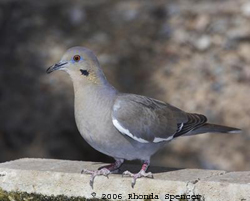Animal Fact Sheet: White-winged dove

Identifying Features
This is a light gray/brown bird with a white area on the wing. When the wings are folded, this area looks like a white stripe on the leading edge of the wing.
Adaptations
These birds can fly 25 or more miles to find water. In the Sonoran Desert, they are able to obtain needed moisture from saguaro cactus fruit. When migrating they can travel in groups of up to 4000 birds to nesting sites.
Habitat
They are found in all desert habitats. In the Sonoran Desert they nest in mesquite, oak woods, in large shrubs, cholla cactus, and in the crotches of saguaro.
Range
In North America it ranges from parts of Canada south through areas of the United States and into Mexico. It is also found in Central and South America as well in Puerto Rico.
Wild Status
They are not threatened or endangered in the wild. At this time their status is good.
Diet
White-winged doves eat seeds from desert willow trees, ocotillo, agave, as well as fruit from saguaro, organ-pipe and other cacti. They also sip nectar from saguaro cactus fruit.
Predators
Predators include fox, coyote, owls, hawks, bobcats, snakes and domestic animals such as house cats and domestic dogs.
Home
A female will select a location to build a nest such as a tangle of vines, clump of cactus or a tree limb. She then builds a nest out of sticks that the male bird will bring to her. On occasion they use an old nest from a previous year, or they will reuse a nest from another bird.
Life Span
In a zoological setting, one dove was know to have lived 25 years. In the wild they don't live as long, only 10-15 years.
Size
They can reach a length of 11-12.5 inches long and weigh about 5 oz.
Quick Facts
-
At one time, flocks of up to 1 million doves were observed feeding in grass fields in Texas.
-
White-winged doves are important to the saguaro cactus because they help disperse seeds through either feces or regurgitation to their young.
Comparison
Compare with the Common Bronzewing of the Australian Desert.
 ©Copyright 2008, Arizona-Sonora Desert Museum
©Copyright 2008, Arizona-Sonora Desert Museum